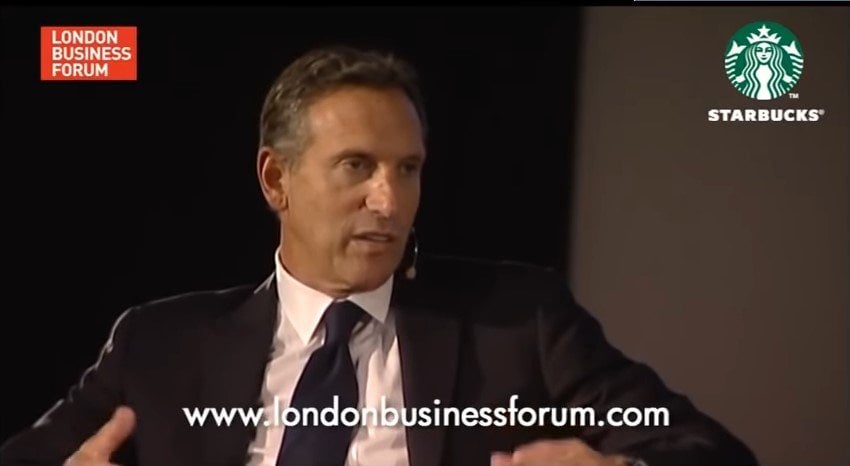An interview with billionaire ex-CEO of Starbucks, Howard Schultz. In this interview, Howard discusses managing Starbucks and leading the company. Howard also talks about his early life in the projects and his motivation.
Q1 hedge fund letters, conference, scoops etc, Also read Lear Capital: Financial Products You Should Avoid?
Billionaire Howard Schultz: Management Principles, Leadership And Early Life
Transcript
OK thank you. Good morning and thank you all for coming. I really appreciate it very much. My story I think has been well told in that I grew up in what is is entitled In America the projects which is federally subsidized housing really literally on the other side of the tracks. My dad never made more than 20000 dollars a year. He was a blue collar worker. And I think I saw as a young child the fracturing of the American dream in that unfortunately my parents were not educated and they didn't have the resources to take advantage of what America really had to offer. And I think that really did shape how I would see the world if I took you to where I grew up. The odds on me getting from there to here is not something you would have bet on. And I think I was very fortunate to be to to put myself in a position to succeed. But also I've had a lot of luck a lot of good fortune. But I do say in the book and when I speak to young people I think something that happens along the way is that people are somehow encouraged that perhaps you're dreaming too big or their dreams can't come true. And what I try and encourage young people to avoid is don't allow anybody friends family even your parents to tell you you're aiming too high because if you look at my story it's not a Hollywood movie it's real it's authentic. And it happened to me. I'm not smarter than anyone else and it can happen to you. Business is a team sport.
It's not about one person. And I think I learned that in the sports field and specifically what I mean is success is best when it's shared. You have to be willing I think to share the spotlight with others and if you look at the entire history of our company what we've tried to do essentially is build a company that would balance profitability with a social conscience. And that started with our people and what we've tried to do I think more than anything else is recognize that you can't exceed the expectations of your customers as an enterprise unless you exceed the expectations of your people first. Use the word in the book that you say is not a word widely used in business. Use the word love. Yes. Tell us about your love for Starbucks. Well you know I I've been giving a pretty formal speeches in the last couple of weeks mostly in the U.S. and I start off my first sentence is I want to talk about love now I've talked to business schools I've talked to business people I've talked to CEOs and they know when I say the word love. I think they must think you know what is going on here. And what I what I want to try and say is that I want to explain to the audiences that I've spoken to that I love Starbucks Coffee Company almost as much as I love my family. There isn't anything I would not do to defend the company to preserve it and to try and enhance it and I want people around me who have that same level of commitment.
Now I also linked to something else which is the word humanity because I think that somehow along the way maybe because of the pressure of Wall Street or other shareholders that we've come to believe that the sole responsibility of business is to make a profit. Now I certainly believe that there is a deep tradition fiduciary responsibility for every business to make profit. But I think it's a pretty shallow goal if that is your singular focus and that is all that you stand for. And I also believe that you can attract and retain great people if that's all your in business to do. So the love and humanity is also about creating a value system in which the company stands for something in addition to making money doing great things for the people that it employs in the communities it serves and and I've gotten into trouble a little bit about that especially when I start speaking about the growing responsibility of business because of the pressure on local state and federal governments in terms of their ability to sustain the level of giving that they've given in the past either to citizens or social service organizations. And I think as a result of that and this is not a U.S. phenomenon. Businesses are going to have to do more and they're going to be called on to do more. I also believe that those businesses that do the right thing in the right way will make more profit as a result of doing the right thing. Now you have an interview with The Times The Times described you as the man who sells 11 million cups of coffee a day.





